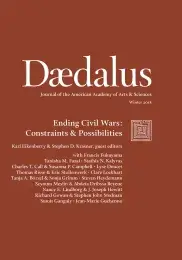Limited Statehood Does Not Equal Civil War
Limited statehood is frequently depicted as a major cause for civil war and violent conflict. Consequently, state-building efforts are often considered to be an effective tool for the prevention of civil war and violent conflict. This essay argues, however, that this assumption is misguided in several respects. First, at present and historically, areas of limited statehood are the global default rather than the exception. Thus, efforts to eliminate limited statehood would likely be unsuccessful. Second, limited statehood does not equal civil war and violence. In fact, only a small fraction of areas of limited statehood are affected by civil war. Third, a too-narrow focus on state-building may be counterproductive, as it may foster ineffective or even predatory state institutions. Such a focus also ignores the plurality of governance actors beyond the state that are relevant for effective governance–such as service provision and rule-making–in areas of limited statehood. Therefore, external actors like international organizations and foreign powers should contribute to governance-building rather than state-building, with a focus on service provision and rule-making institutions with a broader scope than the state.
As Stephen Krasner and Karl Eikenberry have argued, the “standard model for development”–largely based on versions of modernization theory–claims that once countries are set on a path toward economic development, all good things will align and follow: namely, peace, prosperity, and democracy.1 In contrast, Huntingtonians argue that weak state capacity is a root cause for civil war and for the emergence of violent nonstate actors and that building strong state institutions thus constitutes the right “path to Denmark.”2 Indeed, the literature on civil war is full of references to fragile or failed states. Fragile and failed states are usually portrayed as breeding grounds for civil wars and as stomping grounds for all kinds of violent nonstate actors, including transnational terrorists.3 If one were to look only at Libya, Syria, Iraq, Yemen, Afghanistan, the Democratic Republic of the Congo, and the like, one would easily share this view. But there are also Somaliland and Puntland–two provinces of the quintessential failed state of Somalia–which have been rather peaceful over the last two decades.4 How can this variation be explained?
This essay takes issue with both modernization theory and the Huntingtonian approach to state-building that informed Western policies toward war-torn countries in the 1990s and early 2000s. First, we argue that, at present and historically, areas of limited statehood are the global default rather than the exception. Thus, efforts to eliminate limited statehood will likely be unsuccessful. Second, limited statehood does not equal civil war and violence. In fact, only a small fraction of areas of limited statehood are affected by civil war. Third, a too-narrow focus on state-building may be counterproductive, as it may foster ineffective or even predatory state institutions. This focus also ignores the plurality of governance actors beyond the state that are relevant for effective governance–service provision and rule-making–in areas of limited statehood. Therefore, external actors such as international organizations and foreign powers should contribute to governance-building rather than state-building, with a focus on service provision and rule-making institutions with a broader scope than the state.
Our understanding of “limited statehood” must be distinguished from the way in which notions of “fragile,” “failing,” or “failed” statehood are used in the literature.5 Most typologies in both the literature and in datasets on fragile states, “states at risk,” and similar categories reveal a normative orientation toward the Western state model.6 The benchmark is usually the democratic and capitalist state, governed by the rule of law.7 This bias toward Western, consolidated statehood is problematic for two reasons. First, it obscures the fact that most states are neither consolidated nor failed. Rather, they are characterized by areas of limited statehood to varying degrees. Second, this bias toward Western, consolidated statehood prevents us from answering key research questions, including the one investigated here: namely, the relationship between civil war and violence, on the one hand, and degrees of statehood, on the other. If we define statehood by the absence of violence and civil war, we can no longer ask, in a meaningful way, how much statehood is necessary to keep the peace.
. . .
